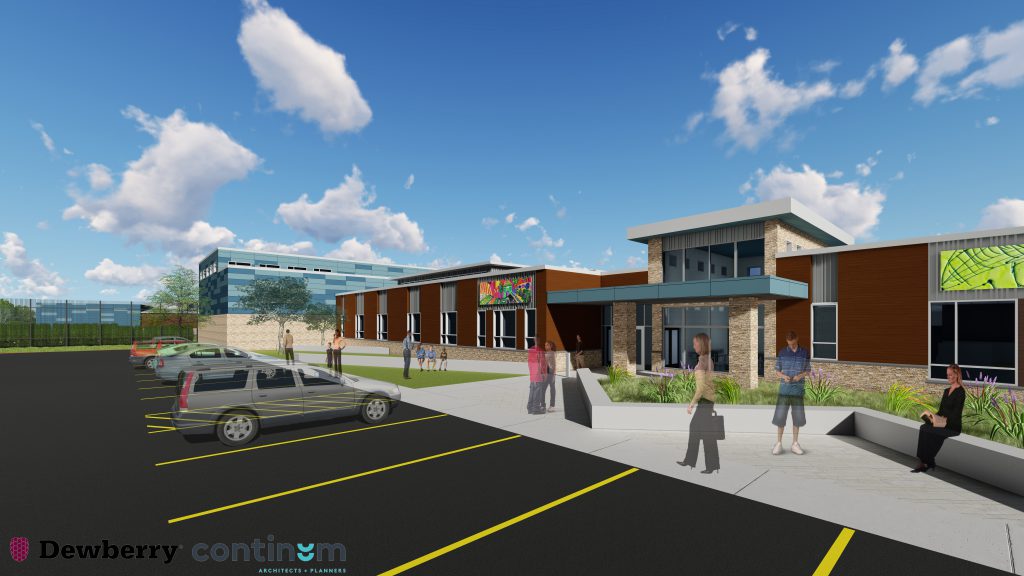Crowley Defers Youth Corrections Grant Until State Has Sustainable Plan
County wants the state to assure enough funding to build and maintain a new facility.
After the state repeatedly cut funding for Milwaukee County’s new youth detention facility, county officials are refusing funding for a new facility until there is a commitment from the state to fund it in a sustainable manner.
In 2018, the state Legislature passed Act 185 which set a timeline for closing the state’s two youth detention facilities — Lincoln Hills School for Boys and Copper Lake School for Girls — by July 2021, after they were the target of a federal investigation into mistreatment and abuse. The legislation also provided funding for counties to develop their own, local detention facilities.
For two years the county has been planning a new facility. And at every turn, the state has forced Milwaukee County to reduce its funding request. Meanwhile, the three other counties involved in the process — Dane, Brown and Racine counties — had their requests approved. Brown County actually received $3.4 million more than it requested.
Milwaukee County was not the only one to request deferral. Dane and Brown counties both requested deferrals.
The county had plans for a new facility and a new approach to youth corrections. Its final funding request asked for $23.6 million to renovate the Vel R. Phillips Juvenile Justice Center into a 32-bed facility that would be more like a residential treatment center than the child prisons at Lincoln Hills and Copper Lake.
But the Legislature’s Republican controlled Joint Committee on Finance cut the plan by $8.4 million, reducing the county’s available funding for a new facility to $15.2 million.
So the county went back to the drawing board and developed a plan that maintained the vision for rehabilitative care in a 32-bed facility. But they couldn’t do it with $15.2 million. Officials estimated they needed another $2.7 million, or $17.9 million.
On top of this funding discrepancy, Crowley said, are the financial challenges Milwaukee County and the state face because of the COVID-19 pandemic. “With county revenues plummeting and cost of services surging, we are concerned about exacerbating these financial uncertainties, unless we receive additional revenue from the state,” he wrote.
“We share the belief with Governor [Tony] Evers that it is necessary and possible to establish a new paradigm of youth justice that assures our youth receive proper care under conditions that promote growth and affirms, rather than destroys, the social contract between youth and society,” Crowley wrote.
Reducing Youth Incarceration Footprint
There are “so many things that are yet undecided in regard to ACT 185,” Mark Mertens, administrator of the Division of Youth and Family Services, told the county board’s Health and Human Services Committee. Among them, as Crowley pointed out, is how the county would even fund the ongoing costs of running the new facility.
“I don’t think that waiting is harming us,” Mertens said. “In fact, I think it’s giving us the opportunity to really test and see what capacity we really need in the deepest end of our justice system.”
County officials are still operating as though the detention facilities will close in 2021, Mertens said. As such, they are trying to reduce the number of commitments the county makes to youth detention using community-based alternatives to incarceration.
The county has reduced its commitments to the state-run youth detention facilities. The average-daily-population of Milwaukee youths in state detention went from more than 70 in 2018 to less than 30 recently. Currently there are zero girls from the county at Copper Lake and 44 boys at Lincoln Hills.
When the county first started planning two years ago, officials thought they would need an 80 bed facility. Not any more. “We will not need anything near that because of the success we’ve had in finding community based alternatives,” Mertens said.
If you think stories like this are important, become a member of Urban Milwaukee and help support real, independent journalism. Plus you get some cool added benefits.
More about the Lincoln Hills and Copper Lake Facilities
- Evers’ Prison Plan Receives Mixed Reviews - WPR Staff - Feb 21st, 2025
- ‘First of its Kind in Wisconsin’ Collaboration Will Support Disabled Incarcerated Youth - Andrew Kennard - Dec 12th, 2024
- MKE County: Tight Budget Forces Difficult Vote on Housing, Juvenile Justice - Graham Kilmer - Nov 1st, 2024
- Letters from Evers, Republicans Show Clash on Juvenile Corrections - Andrew Kennard - Aug 17th, 2024
- Following Counselor Death, Staff, Family Plead for Help At Lincoln Hills - Andrew Kennard - Aug 16th, 2024
- Lawmakers Grill Wisconsin Prison Officials Over Safety, Employee Death at Youth Facility - Sarah Lehr - Aug 7th, 2024
- Future of Lincoln Hills Remains In Limbo - Isiah Holmes - Apr 12th, 2024
- MKE County: County Youth In State Prisons Declining Again - Graham Kilmer - Jan 15th, 2024
- Legislative Committee Okays $6 Million for 2nd Juvenile Facility - Devin Blake - Oct 1st, 2023
- Some Progress, Still Problems at Lincoln Hills - Isiah Holmes - Jul 9th, 2023
Read more about Lincoln Hills and Copper Lake Facilities here
Political Contributions Tracker
Displaying political contributions between people mentioned in this story. Learn more.
MKE County
-
Ron Johnson Says Free-Market Principles Could Fix Education
 Jul 17th, 2024 by Graham Kilmer
Jul 17th, 2024 by Graham Kilmer
-
RNC Will Cause Some County Services To Be Moved to Wauwatosa
 Jul 12th, 2024 by Graham Kilmer
Jul 12th, 2024 by Graham Kilmer
-
Hank Aaron State Trail Will Be Closed For RNC, State Fair
 Jul 12th, 2024 by Graham Kilmer
Jul 12th, 2024 by Graham Kilmer






















